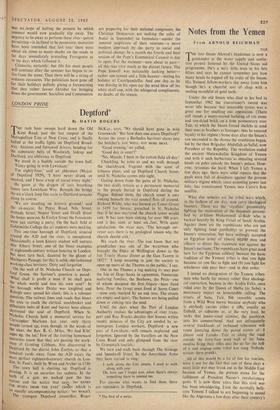LONDON PRIDE
Deptford*
ROGERS By DAVID
THE rush hour sweeps hard down the Old Kent Road, past the last outpost of the Metropolitan Line at New Cross, and is finally halted at the traffic lights on Deptford Broad- way. Anxious and furrowed drivers, heading for the commuter belts of Woolwich, Sidcup and Dartford, are oblivious to Deptford.
We stand in a huddle outside the town hall. `Fancy going in with Lewisham.'
'I'm eighty-four,' said an alderman (Mayor of Deptford 1929), 'I have never drunk or smoked, and I have a 'cup of cocoa-every night.'
He gazes at the dragon of cars breathing fumes into Lewisham Way. Beneath the bridge the six o'clock loop line train to Dartford screams along its course.
'We are standing on historic ground,' said the ex-mayor. In Pepys Road. Nile Street, Armada Street, Napier Street and DraA Street the boxes were on. In Evelyn Street the Jamaicans were just starting a party. On the back field at Goldsmiths College the art students were necking.
This one-time borough of Deptford, situated around the A20 and the river, is unexplored. Occasionally a keen history student will venture into Albury Street, one of the finest examples• of eighteenth-century artisan housing in London. Rut most turn back, daunted by the gloom of Mechanics Passage, for this is solid, old-fashioned Working-class territory. Dirty and forgotten.
On the wall of St. Nicholas Church on Dept- ford Green, the Saviour's question is posed: `What shall it profit a man if he shall gain the whole world and lose his own soul?' In the borough where Drake was knighted and Raleigh once spread his cloak, this is a relevant question. The railway lines and roads that bisect the area to reach the clerical, stockbroker and debutante belts of Kent and Surrey have almost destroyed the soul of Deptford. When St. Nicholas Church held a memorial service for Christopher Marlowe last year. only thirty People turned, up, even though, in the words of the vicar, the Rev. R. G. Miles. 'We had RAC signs up, the lot.' Few of the fretting homeward motorists know that they are passing the work- shop of Grinling Gibbons, first discovered in Deptford by the diarist John Evelyn.) or that a hundred yards away from the A20 exists the Most perfect eighteenth-century church in Lon- don, St. Paul's, built by Wren and Archer in 1730. The town hall is shutting up. Deptford is Passing. It is an occasion for sadness. In the teeth of a gale we walked past the bus station and the notice that says, `NO ENTRY FOR BUSES FROM THE EAST' (udder which is an equally uncompromising notice: 'NO WOGS').
The youngest Deptford councillor, Roger
McKay, says, 'We should have gone in with Greenwich.' But how does one assess Deptford?' Across the street a Barbados barrister stares into the butcher's. EAT WELL. EAT MORE MEAT.
`Good evening,' we yelled.
`Good day in court?'
'No, Mistah; I been in the cotton field all day.'
Chuckling, he joins us and we walk through the churchyard, fragrant with the scent of tobacco plant, and. up Deptford Church Street, until St. Nicholas comes into sight.
' Gazing down from the gates of St. Nicholas, the two skulls remain as a permanent memorial to the people buried in Deptford during the Plague. Behind them, the church tower is ever sinking beneath the vast council flats all around. Richard Wiche. who was burned on Tower Green in 1439 for heresy, preached in St. Nicholas that if he was martyred the church tower would sink. It has now been sinking for over 5IX) years and it has sunk at least six .feet. With quiet satisfaction, the vicar says, `The borough sur- veyor says there is no, geological reason why the
church should sink.' -
We reach the river. 'Do you know that my grandfather was one of the watermen who brought the Duke of Wellington down to the last Trinity House dinner at the Gun Tavern in 1852?"I keep meaning to join the society to open up more of the Thames to the public,' I say.
Out in the Thames a tug making its way past the Isle of Dogs hoots in agreement,. Numerous seafaring families. the Benbows. the Petts- -one of whom designed the first frigate--have lived here. Peter the Great once lived at Sayes Court —now only marked by an oak tree. The streets are empty and quiet. The houses are being pulled down or sinking into the mud.
Until the days when the Port of London Authority realises the' advantages of river trans- port and Roy Brooks decides that houses within twenty minutes of the City are needed by re- immigrant London workers. Deptford -a new part of Lewisham—will remain neglected and forgotten. Ignored by the travellers on the New Cross Road and only glimpsed from the river by Greenwich tourists.k
We turn and walk back through The Stowage and Speedwell Street. In the Amersham Arms they have started to sing: 1 walk along the City streets. 1 used in walk along with you. Oh. how can I forget you, when there's always something there to remind me.
For anyone who wants to find them there are reminders in Deptford.
The first of a series






























 Previous page
Previous page